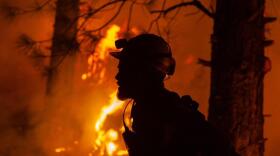There’s a multitude of climate change-driven issues that Midwest is already starting to face and that will only get worse.
This includes long stretches of drought followed by heavy periods of precipitation leading to flooding.
Lake Superior is one the fastest warming lakes in the world.
Wisconsin is among the top states in the U.S. with the fastest warming winters which can impact everything from lake health to agriculture.
While these things may not seem as dramatic or dangerous as rising sea levels, more frequent hurricanes, and more intense wildfires that are seen in other parts of the country, that in itself can lead to other issues.
“The Midwest, the upper Midwest, particularly the Upper Midwest is being promoted as kind of a climate refuge for people. One of those places where people are going to migrate to as the climate changes in other parts of the country,” said Rob Croll. “We may have to deal with an influx a much larger population in this area and effects that’s going to have on our natural resources.”
Croll is a policy advisor for the Great Lakes Indian Fish and Wildlife Commission’s inter-governmental affairs. He coordinates GLIFWC’s climate-change program.

GLIFWC represents 11 Ojibwe tribes in the Wisconsin, Michigan, and Minnesota and is now part of the Midwest Climate Adaptation Science Center Consortium.
Based at the University of Minnesota’s Institute on the Environment, the consortium will research the threats climate change has on natural resources and people in the Midwest.
“We are about delivering science to help wildlife, ecosystems, and people adapt to changing climates. We work with Department of Interior, state, tribal nations, and other partners create research and tools that can be applied directly to adaptation decisions,” said Olivia LeDee, the acting federal director of the Science Center.
The Science Center is already working on 17 projects across the Midwest.
They range from fish habitat sustainability to wild rice restoration.
LeDee says the research is focused on what will be the most negative impacts of climate change and how do we adapt to lessen that impact.
“Our five issues that we’re really going to be focusing on are heavy rainfall and drought, loss of winter, ultra-hydrological regimes, novel terrestrial landscapes, and barriers to and opportunities for adaptation,” said LeDee.
A climate change report published by the Governor’s Task Force on Climate Change has shown that people of color and low-income communities are some of the most adversely affected.
It’s an important reason by both GLIFWC and the College of Menominee Nation were selected for the consortium.
“Tribal communities by nature of their underserved status are disproportionately affected by climate change, so they’ve taken a leadership role in this,” said Croll.
Tribes in the region have taken the lead on projects like wild rice and Great Lakes shoreline restoration.
Croll said while climate change mitigation needs to happen at the national and inter-national level, having this consortium gives all people in the Midwest the best tools to adapt to the changes already impacting our communities.
“Adaptation is local. Having a Midwest climate adaptation science center really reflects the needs and goals all the people in this region,” said Croll.
The University of Wisconsin, Michigan State University, the University of Illinois, and the Nature Conservancy also make up the consortium.
The Midwest CASC is the ninth and final member to the CASC network. Research will be done in Minnesota, Wisconsin, Michigan, Ohio, Indiana, Illinois, Iowa, and Missouri.
The work used to be part of a larger consortium that include the Northeast U.S.









